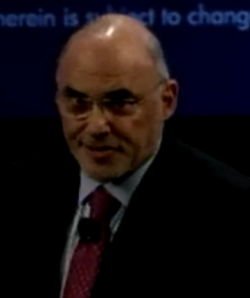HP's new strategy: Public cloud, analytics, big data appliances

Hewlett-Packard CEO Leo Apotheker outlined a new strategy that relies heavily on analytics software and being a cloud platform. In addition, HP will launch a public cloud platform that will serve multiple languages and services.

On the software front, HP will focus on management and security, information management, analytics and cloud computing. "We are increasingly moving toward software as a service." He cited digitization software, airline ticketing and other applications delivered as a service.
HP will also partner with large transactional systems. That comment indicates that HP is aiming to position SAP and Oracle as software plumbing. Apotheker said that HP will focus on analytics. In fact, the CEO argued that HP can leapfrog in software since it doesn't have a legacy business to protect. Apotheker touted the recent acquisition of Vertica and how HP will become a business intelligence player with a focus on so-called "big data," structured and unstructured information and everything in between.
Indeed, HP has Veritca-powered appliances set in half-rack and full racks once the deal closes. Vertica will be sold as software, a cloud service and as an appliance.
What's unclear is how many parts HP has to acquire to nail its vision. Apotheker said that HP will have a disciplined acquisition strategy. Listening to this talk it sounds like Teradata could provide a big bang.
Apotheker said:
Hewlett-Packard has a storied history of innovation. Over the past 70 years HP has innovated and provided leadership at inflection points. Today we also stand at an inflection point. Yes, HP is strong, but we recognize that the world is changing faster than ever.
From there, Apotheker talked about data and how developers trust open innovation and how every transaction (information and data) can look personalized. "It is a vision that requires leadership in consumer, small businesses and enterprise," said Apotheker.
Part of HP's new strategy revolves around information access. The subtle changes were clear in the company's handouts. HP's new terms revolve around cloud, connectivity, digitization, security and services. Out: Things like printers and PCs.
HP's new mission: Provide seamless, secure, context-aware experiences for a connected world.
Apotheker said customers were looking for a simple elegant technology as enterprise and consumer markets meld. "At the heart of all of this is cloud computing and connectivity," said Apotheker. HP will aim to be a tour guide to "optimizing the traditional stack" for the future.
The HP CEO also seemed to recast the traditional stack pitch pushed by former chief Mark Hurd. Apotheker positioned HP more as services and integration player that can evolve technology ranging from traditional devices to mobile categories to the cloud.
Key points:
- HP will push the WebOS and in multiple devices. "WebOS will provide one user interface across home, the business and the enterprise," he said.
- PCs and printers aren't going away. "People like to use PCs and printers," said Apotheker. "Traditional technology is where we create a lot of value."
- HP's current assets position the company for the future.
- The new stack will feature connected devices, open cloud marketplace, cloud services, platform services and hybrid infrastructure.
- Enterprises will have hybrid technology---cloud and their own infrastructure---for the foreseeable future.
- Services will be used to position HP as a trusted partner.
- HP's cloud strategy will build a cloud services and public cloud offering "in the near future."
- Security will be an enabler for all of the above items.
Following Apotheker's talk, a bevy of HP executives were on deck. One notable point from the schedule: HP's PC chief Todd Bradley was on tap to talk about connectivity. There was no mention of PCs anywhere on the official documents at HP's Summit 2011. Given the slow-growth and commodity nature of the consumer PC business today, that omission is understandable.